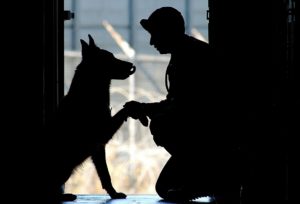
Tips to Teach Your Old Dog New Tricks
Who says an old dog can’t learn new tricks? The age of your dog does not define his or her ability to learn – all owners know just how smart their dogs are. If anything, the age of a dog should prove that he has already learned so much over his lifetime. Not only is it fun to teach your old dog new tricks, it can keep him mentally stimulated! The catch is that being older also means that your dog may be set in his ways. He is not as shocked with new experiences or as motivated by treats. Unlike puppies who are impressionable with their little worldly experience, your old dog will need a different approach. Want to teach your dog new tricks? Here are some tips to help.
Take it Slow

When you teach your old dog new tricks, it is important to take it slow. Although your dog has mastered all the other tricks and excels at doing them, he will need to start from the beginning. A common mistake people make is assuming that since their dog knows other tricks, that they can skip the basics of new ones. Because your dog is not a puppy anymore, he will need you to go step-by-step.
- Begin by using voice and hand commands to show your dog the new command and behavior you are asking for.
- Start rewarding your dog when you help him perform the desired behavior (ex. you grab his paw when you say “shake” – then reward).
- Repetition is key in these training exercises. Continue to do the new trick over and over, displaying the command and behavior with your dog.
- Give him the opportunity to perform the behavior on his own (you hold out your hand when you say “shake”). This gives you a chance to see if your dog understands the command, and allows him to try it out.
- If he does not perform the behavior, assist him, give a reward, and continue the process.
- When you see your dog exhibit anything close to the behaviour, reward and praise him. Let your dog know that he did what you wanted.
Change Your Surroundings

If you decide to teach your old dog new tricks, training her in a different environment can help. Because your dog is used to her home environment, she knows the routine and sticks to it (mornings mean a walk, afternoons mean relaxing). Asking your canine to perform a trick when her favourite bone is lying on her bed nearby will become a battle of will. In a new environment, there are different smells and things to see; therefore your dog’s energy is higher. It is in a changed environment, you can use that energy and direct it towards teaching the new trick. A new place can help your dog understand that something new is expected of them. Simply getting out of the house can also encourage mental stimulation to stay focused on the task at hand. Teaching something new will still require patience, but if the reward is motivating and your dog has the energy, training will go smoother.
Use a New Reward

As dogs get older food may no longer be the primary motivator. Instead, your dog is more willing to lie around rather than perform a behaviour for a treat he doesn’t want. When you want to teach your old dog a new trick, it can be difficult if there is not enough motivation. It is in these instances that you need to find a better reward to encourage behaviour. Rewards can come in many different forms: food, praise, a beloved toy, or a favourite event (drive, walk, etc.). Finding a new reward to motivate your old dog can help him towards learning new tricks.
Special Treat
It is fun to find that special treat that your dog will crave. Look for something special and flavourful that she will enjoy and be willing to work for. Perhaps that piece of cheese she gets every so often is enough for your dog to stop, drop, and roll. In other cases, you may have to look a bit harder to find that extra-yummy treat. Sometimes using cooked chicken, a little bit of peanut butter, or maybe even some apple can be motivation enough! Make sure that whatever treat you select, it is healthy for dogs – some human foods can be harmful. Once you have found the delicious treat for your dog, use it and work towards performing those amazing new tricks – but at no other time.
Praise
Depending on how your dog has been trained, praise is another great motivator. When your dog displays the behaviour asked for, praise him and get excited. He will be so happy to have pleased you and been rewarded with excitement that he will willingly do it again. Get enthusiastic, show your dog how proud you are, and give those amazing ear scratches when he obeys. The more you do this, the more you can work towards teaching your old dog new tricks without adding to his waistline (which can lead to sore joints).
Keep Training Sessions Short

Your dog is old and tires more easily than she did a few years ago. Because she no longer has that puppy energy to continue doing one trick after the other, keep your training sessions short. Your dog’s attention span will be shorter when learning a new trick, especially if she is not motivated by the reward. When you keep training sessions short, your dog will be able to focus on the moment and commands. Short sessions can also keep things exciting for your dog. Your dog knows that these few minutes every day before dinner is where she receives some delicious treats or amazing praise. It can even be something your old dog eventually looks forward to. Keeping training sessions short is beneficial for you as well! It can be frustrating not to see your dog catch on quickly and it is important to be patient. When you shorten the time spent on the trick it will keep you from getting upset and your dog from associating negativity with the task.
Use these tips to teach your old dog new tricks and you will be amazed at how fun it is to learn together. Teaching a trick is a great way to keep your dog’s mind stimulated and is a wonderful opportunity to bond with your dog. Be patient, encouraging, and rewarding and you will be in awe with the things your old dog can learn! What could be the next trick you teach?
